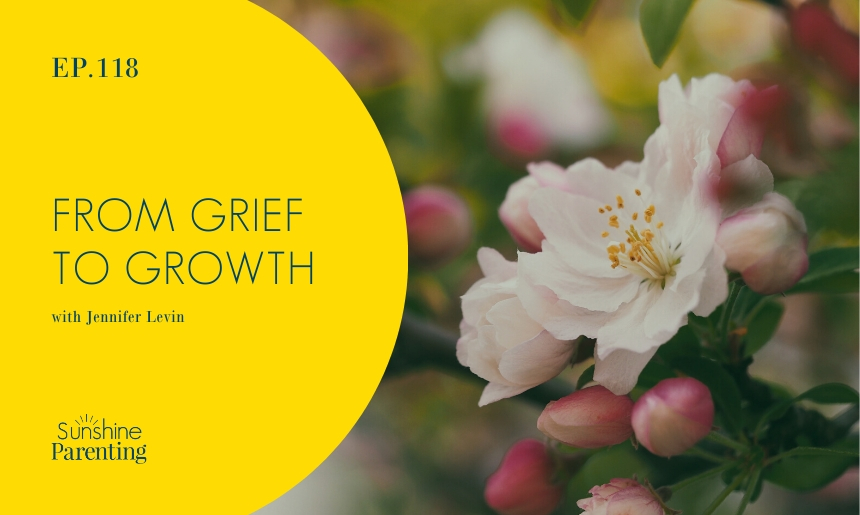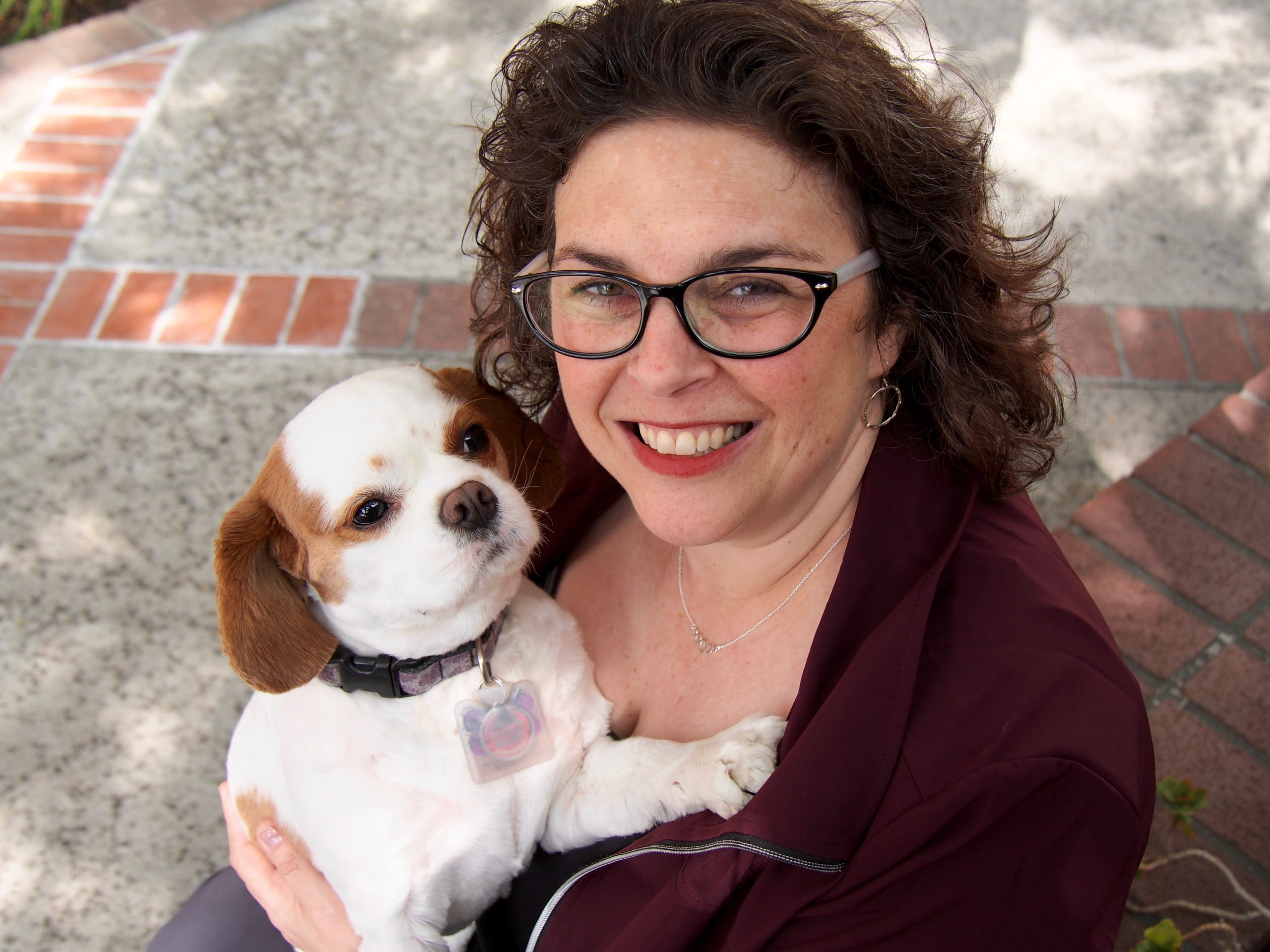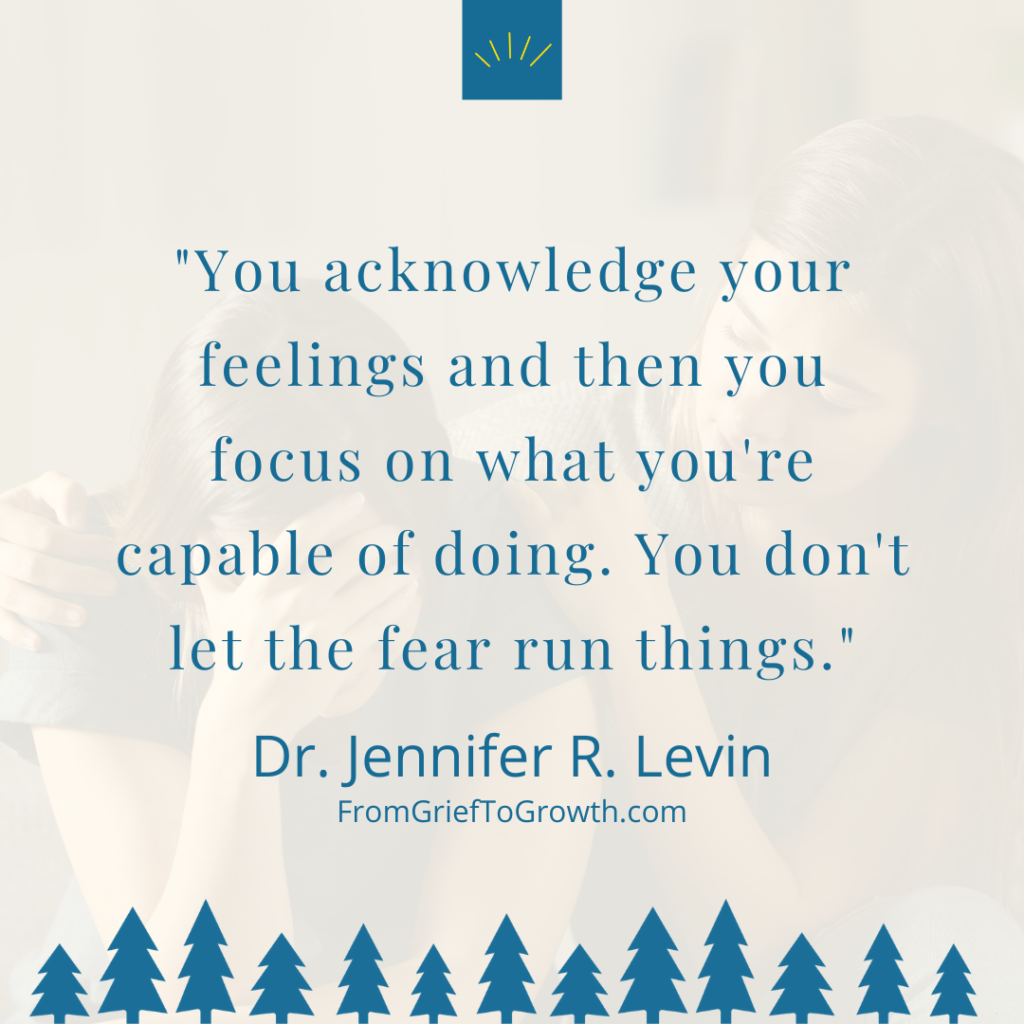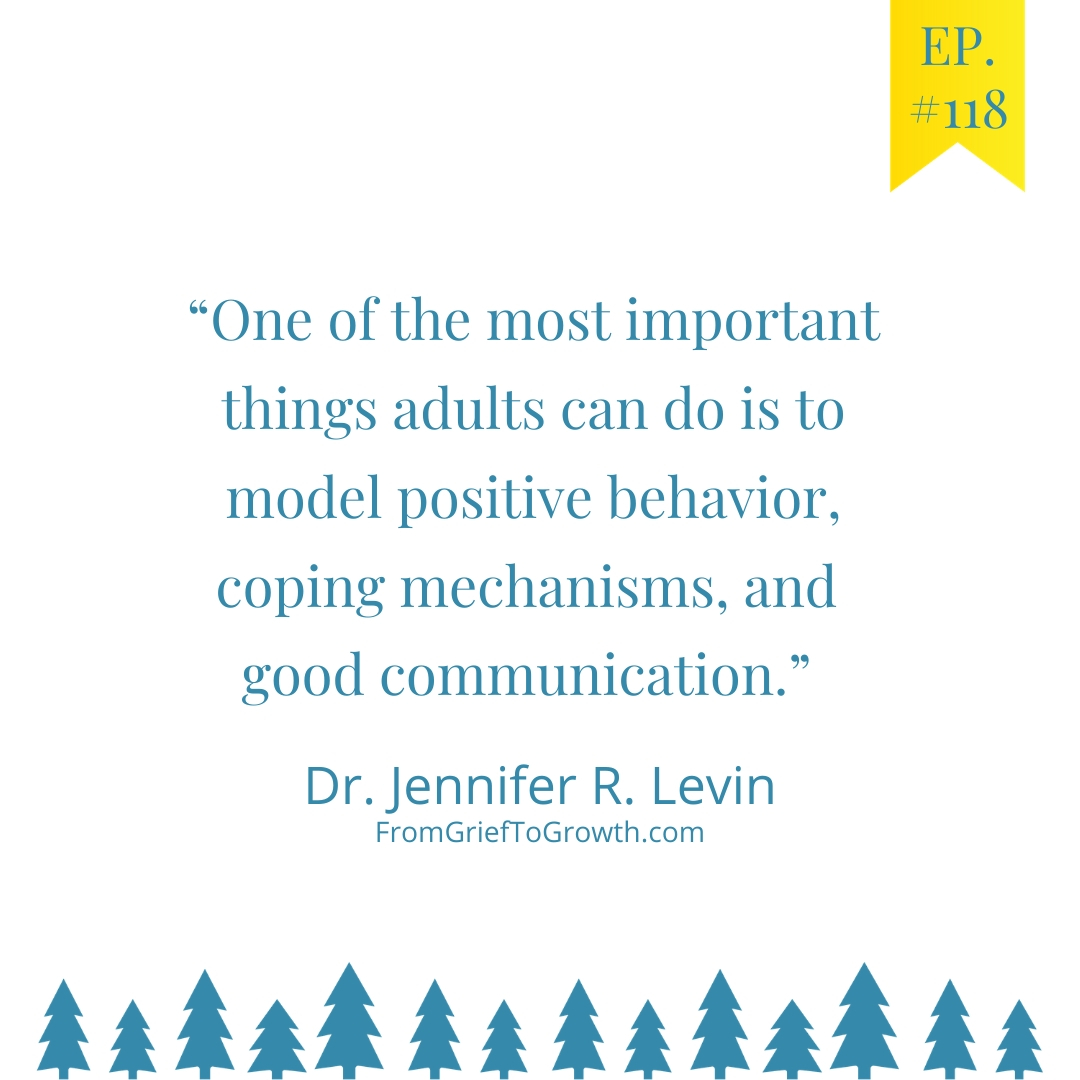
Show notes & links available here.
In this episode, I’m speaking to Dr. Jennifer Levin, a marriage and family therapist who specializes in health crises or transitions, especially related to traumatic grief and loss. We discuss ways to support others, particularly children, and promote growth after trauma.

Jennifer R. Levin, MFT, Ph.D., FT
Big Ideas
- Traumatic grief is an unexpected, sudden loss that people experience.
- Sudden, devastating events can cause a great deal of grief, trauma, and stress.
- People experience post-traumatic growth when their life changes significantly for the better due to the experience they had with the trauma.
- There are four areas wherein people experience post-traumatic growth:
- deeper relationships
- increased personal strength
- positive spiritual changes
- stronger appreciation for life in general
- Kids and adults react differently to grief and trauma. Kids tend to float in and out, whereas adults may get stuck in deep sadness and experience more of the traumatic symptoms.
- The first thing to do for children after a traumatic loss is to assure safety and reestablish some normalcy and a sense of routine and structure.
- Helpful tools for kids are sensory-based activities, mindfulness skills, guided imagery, and visualizations. We can help them learn how to take control of their situation and give them positive feedback and praise when they use a great coping skill.
- Make sure children are exposed to positive relationships with other supportive adults in their lives.
- Especially in the case of loss, it is important for families to keep talking about their feelings.
- Memory Bowl Tip: keep a bowl and a stack of index cards in an accessible place. Any time you have a memory of the person, the dog, the loved one who has died, you write it down on the card and put it in the bowl. Then, when you’re having a tough grieving day or on an occasion when the family is together, everyone can read the memories that are in the bowl. This is a great way to keep memories and family times together alive.
Quotes
Jennifer: “It’s pretty amazing watching someone come in right after a loss, working through them to address both the trauma and grief and then having them say, ‘Oh my goodness, I think I’ve grown in (this way)’ and to be able to focus on that.”
Audrey: “Unfortunately, we are inevitably going to face grief of some kind. It’s hopeful to think that it doesn’t have to lead to disaster.”
Audrey: “Many of us have been blindsided by the experiences that kids share with us in the camp or school setting, where they share something really hard that they have gone through.”
Jennifer: “Right after an immediate loss that’s been traumatic, the first thing to do is to assure safety, establish some normalcy and a sense of routine when the world feels chaotic and out of control.”
Jennifer: “We see behavioral problems come up, problems with sleep, academics, friends, when there is no routine or structure or normalcy.”
Jennifer: “Containment may not necessarily lead to post-traumatic growth, but more stabilization, which is the first thing we have to do before we can start addressing trauma and grief.”
Jennifer: “Post-traumatic growth is something that happens over a significant period of time and adults can play a huge role in decreasing the chances that a child will have longterm difficulties and increasing the chances for post-traumatic growth.”

Jennifer: “Sometimes we have to say, ‘I’m not sure how this is going to play out in the future, but right now you are safe. I got you. You’re okay. I love you. All of your needs can be met right now.’ This gives them a really strong foundation for growth.”
Jennifer: “One thing that goes without saying is parents and adults have to take care of themselves first before they are able to give this to kids. Kids are able to tell when it’s inauthentic, insincere, and when the parents are running on empty.”
Jennifer: “Positive relationships with adults help foster post-traumatic growth. If it’s not a parent, then its a teacher, a coach, a religious figure.”
Jennifer: “Kids and adults react differently to grief and trauma. I think it’s wonderful that kids can float in and out, in and out, and when they’re in the moment, the feelings are intense, difficult, scary and overwhelming. But again, with the right support and encouragement, they’re going to transition out and be okay.”
Jennifer: “We as adults have such a role in teaching our kids how to express themselves, how to get these feelings out, and then how to cope with them.”
Audrey: “Usually if a child is grieving about something, usually the adults who are closest to them are also grieving. Getting outside help is so important, even if your child appears to be fine. For them to be aware that these feelings may come up at any time and there are resources for them. That’s a really important thing.”
Jennifer: “Grief is such a unique experience for every person, every family. Everybody in a family grieves differently. I’m really big on acknowledgment, an adult acknowledging that they’re sad or grieving, that they’re fearful–that’s the very first step.”

Jennifer: “Acknowledge the pain. I think it’s great for your kids to see you cry. It’s great for them to see you express emotion and for you to say, ‘Mom is really sad right now, but I’m okay. You’re okay and we’re going to be okay.’ Then talk about that.”
Jennifer: “Checking in is important because it gives the message, ‘I’m here if you want to talk and if you don’t, that’s okay.’ So what you do is monitor other things: Are they socializing with their friends? Are they doing well in school? Are they sleeping? Are they eating? Are they doing extracurricular activities? When you start to see issues there, then that’s a red flag. Even though they’re not talking about the grief, it’s definitely impacting them.”
Jennifer: “We grieve the way we live. If we’re someone who doesn’t share our feelings very often, then when we experience grief we are not all of a sudden going to become someone who talks about all of our feelings.”
Audrey: “Keep talking about the person. Some people think it’s better not to bring the person up but the last thing that someone who is grieving wants is for people to forget the person who was so important to them.”
Links
More information on Dr. Jennifer Levin’s private practice can be found at therapyheals.com.
Visit her new site: fromgrieftogrowth.com. You will find her free mini video course, 3 Tips for Surviving Traumatic Grief.
 Dr. Jennifer R. Levin specializes in working with adults, adolescents, and teens experiencing traumatic grief and sudden loss. In 2000 Jennifer received her doctorate from UCLA in public health focusing on the needs of cancer patients at the end of life. She has served as the executive director of Hospice of Pasadena and volunteered with the American Cancer Society and the Wellness Community. Jennifer provides continuing education training, consultation, and mobile grief services to schools and community-based organizations experiencing bereavement and loss. Jennifer is a licensed marriage and family therapist with a private practice in Pasadena where she works with clients living with chronic and terminal illness, bereavement and complicated loss and traumatic death. She facilitates support groups in traumatic grief, spousal loss, teen grief and also specializes in post-traumatic growth.
Dr. Jennifer R. Levin specializes in working with adults, adolescents, and teens experiencing traumatic grief and sudden loss. In 2000 Jennifer received her doctorate from UCLA in public health focusing on the needs of cancer patients at the end of life. She has served as the executive director of Hospice of Pasadena and volunteered with the American Cancer Society and the Wellness Community. Jennifer provides continuing education training, consultation, and mobile grief services to schools and community-based organizations experiencing bereavement and loss. Jennifer is a licensed marriage and family therapist with a private practice in Pasadena where she works with clients living with chronic and terminal illness, bereavement and complicated loss and traumatic death. She facilitates support groups in traumatic grief, spousal loss, teen grief and also specializes in post-traumatic growth.
Related
If you enjoyed this episode, check out:
